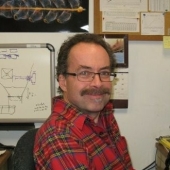
Some lessons and challenges in building a sustainable seaweed business
Steve Eddy, Science Advisor, Maine Coast Sea Vegetables, USA

Some lessons and challenges in building a sustainable seaweed business
Steve Eddy, Science Advisor, Maine Coast Sea Vegetables, USA
About the speaker:
Steve is Director of the University of Maine’s Center for Cooperative Aquaculture Research (CCAR), as well as Science Advisor for Maine Coast Sea Vegetables (MCSV). A native of New England, he has worked in the aquaculture profession since 1996 growing various finfish such as flounder, Atlantic halibut, amberjack, and other marine finfish species, sea urchins, and macroalgae. In 2018 he began working with MCSV to run their testing program and to help the company navigate the many regulatory and scientific issues surrounding the processing and sale of wild-harvested dried sea vegetables for human consumption.
Company info:
Maine Coast Sea Vegetables was founded in 1971 by Shep and Linnette Erhart in their farmhouse kitchen, inspired by a pot of miso soup that was especially delicious. They realized that the soups’ full, rich flavor came from the wild Alaria they had gathered from the shores of the Schoodic Peninsula, and they soon began sharing their Atlantic Wakame and other wild-harvested sea vegetables with friends and neighbors. At the time, there were few other folks harvesting and selling seaweed in Maine, and within a few years the Erhart’s built one of the most recognized and trusted brands in the industry. Today, Maine Coast Sea Vegetables is an employee-owned company operating out of a modern processing plant in Hancock, Maine. Every year, our team of over twenty people sorts, packs and ships several hundred thousand pounds of sea vegetables to customers all across the United States (& Canada). We pride ourselves on being able to offer reliable and trustworthy information on the nutritional, health, culinary, and environmental benefits of North American sea vegetables.